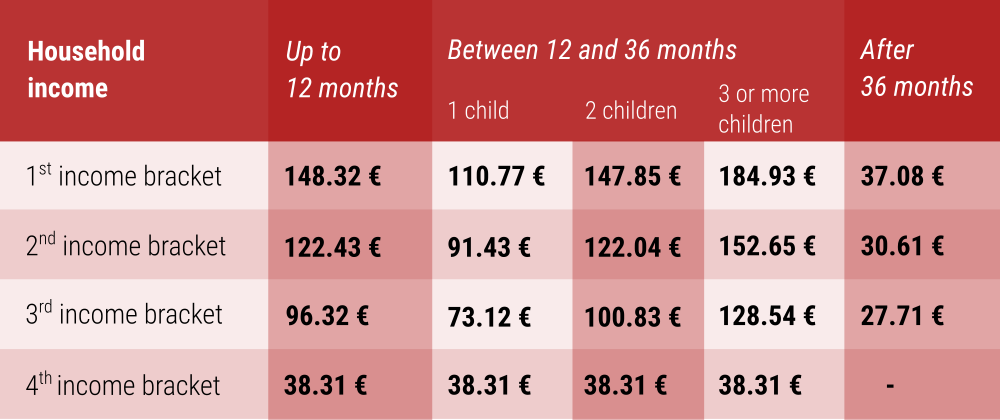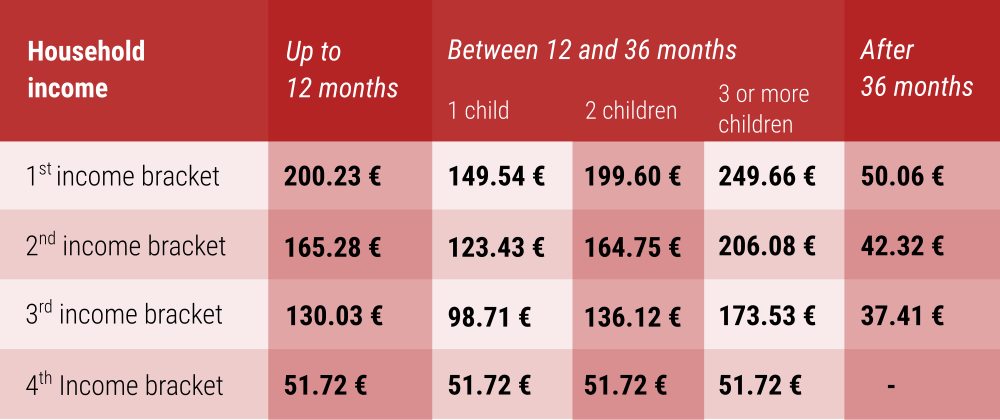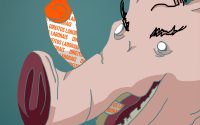Portugal // Parenthood: a capitalist obstacle course~ 19 min

By Nguyen
We’ve grown used to listening to the talking points of right-wing parties on TV about the need for people to have more children. Such pronouncements are offered to us decontextualized and carrying a paternalist or accusatory tone. However, as many workers have by now realized, it is much easier to have children than to have the capacity and conditions to raise them.
This detail is of little interest to these same parties, who are more preoccupied with having a fresh batch of workers to exploit while at the same time not making available the resources necessary for the personal development and education of these “workers to be”; left-wing parties don’t fare much better, lost as they are in a haze of blurry policies and half-measures.
Contents
- Birth rate numbers
- Maternity and paternity leaves
- Breast-feeding and health
- Sleep, or the lack of it
- Education during the first years of life
- Inadequate subsidies
- Conclusions and measures
Birth rate numbers
Without getting into pro or anti natalist arguments, it should not be controversial in principle that those who decide to have children should have the means to raise them. Towards that end, favorable economic conditions are required.
The practical result of the current hostile policies towards parents and children is that the birth rates in Portugal have seriously diminished during the period of the last crisis which dragged on from 2007 until 2014. In 2007, the gross birth rate (the number of live births per 1000 inhabitants) dropped to less than 10 children. It hit the lowest point in 2013 and 2014, with 7.9 live births.
This value is very close to Japan, which had 7.7 live births in 2017, a country which is now losing population. In 2016 and 2017, the value rose to 8.4 live births. All signs point to a new increase in 2018. Meanwhile, during the austerity years promoted by the Socialist Party (PS), the Social Democratic Party (PSD) and the Democratic Social Center (CDS) party, 130 000 women of fertile age emigrated between 2010 and 2015.
The first obstacle to parenthood in Portugal is thus the hostile economic condition endured by the working population.
Maternity and paternity leaves
The current leave corresponds to a maximum of 180 days, if it is shared between both parents. 150 days for the mother and 55 for the father, maximum. In the case of people who live alone with their children, the time is reduced to a maximum of 150 days. These values may increase in the case of twins.
Use of the maximum leave periods allowed is punished with a 17% to 20% reduction in the corresponding subsidy. These penalizations are an indicator of the logic behind the natality policies. Meaning, you’re not supposed to excessively inconvenience the companies and the magnanimous entrepreneurs with the absence of the people who do the actual work.
After two years of discussion over a detail regarding parents’ leave, the number of obligatory leave days was increased by five days. Two years to discuss five leave days, while still perpetuating the unbalance between the sexes, with most of the workload being placed upon the mother. Such a leave time is inadequate, as is the duration inequality between sexes, and we shall see why.
Breast-feeding and health
Both the World Health Organization and Unicef recommend that children should be exclusively breastfed until they are six months old. Additionally, the breast-feeding period should be prolonged until they are two years old, while adding other foods.
These recommendations are due to the fact that mother’s milk is the healthiest food a child can consume, leading to lower child mortality rates and the overall improvement of the baby’s health. Breast-feeding exclusively with mother’s milk up to six months of age results in a lower number of hospital visits, lower occurrence of common diseases (such as diarrhea, vomits, ear infections, etc.) and reduces the possibility of developing a chronic disease (such as diabetes, child leukemia, obesity, etc.).
The benefits of mother’s milk have been known for decades. But this knowledge and the good practices necessary to apply it have had to face the usual web of capitalist interests and the governments who sustain them.
After taking her maternity leave, a mother can require a daily work dispensation to breastfeed for as long as breast-feeding continues. In case there is no breast-feeding, one of the parents or both may have the right to enjoy the same dispensation until the child is one year old. The law says that:
3 – The daily breast-feeding or feeding dispensation is to be enjoyed over two distinct time periods, with the maximum duration of one hour each, unless a different regime is agreed upon with the employer.
4 – In the case of multiple births, the dispensation referred to in the previous article is granted and an additional 30 minutes for each twin after the first.
One might infer that each child requires 30 minutes of attention (breast-feeding, diaper changing, cleaning and hygiene of all people involved). Meaning 30 minutes are dedicated to traveling to and from work to home. Who lives 15 minutes away from home?
According to a study, 34 minutes are spent on average in Portugal for work-home travel, totaling 68 minutes daily. National Institute of Statistics data indicates that a one way commute at the Porto Metropolitan Area takes, on average, 21 minutes and 8 seconds. At the Lisbon Metropolitan Area, it takes 24 minutes and 3 seconds. Out of personal experience, the 2018 travel time is approximately 1 hour. There are worse cases – 1 hour and 30 minutes to 2 hours travel time. With the biggest cities undergoing aggressive gentrification, and the subsequent population drain towards the periphery, the time it takes to get to work or home is only set to increase.
One of the ways children are harmed is thus in the secondarization of their physical and mental health in order to avoid bothering companies’ profits. Yet, there is nothing to fear. When parents can’t take care of their children’s needs, a vast industry can do it for them.
In 1974, the “Babykiller” report was published, accusing Nestlé (and other companies that commercialized baby formula milk) of provoking the death and hunger of Third World babies:
Third World babies are dying because their mothers bottle feed them with western style infant milk. Many that do not die are drawn into a vicious cycle of malnutrition and disease that will leave them physically and intellectually stunted for life.
Like the good entrepreneurs they are, Nestlé opted to continue killing babies while taking the report authors to court. Alarmed over the actions of Nestlé, the populations of several western countries launched a boycott to force the company to change their practices.
It was only in 1981, seven years after the report’s publication, that the WHO published a guide regarding the promotion of baby formula milk and prohibiting some forms of “aggressive marketing” by the companies. To this day, Nestlé is still involved in several scandals, at different times and in different countries, connected to their baby formula sales.
Nestlé is not the source of all evil, nor it is an isolated case. In 2017, in Great Britain, the companies Enfamil, Sprout and Plum Organics were caught selling baby food containing dangerous levels of arsenic, cadmium and acrylamide (a carcinogenic product that may cause skin irritation and affect sperm quality); and Bisphenol A (an industrial product used to manufacture plastic).
In 2017, the French Lactalis was caught selling salmonella contaminated powdered milk. It was only after government intervention that the contaminated products were removed from the market.
In 2018, Lactalis was once again caught selling powdered milk containing salmonella, triggering a new intervention by the French government. This illustrates how political decisions around parenthood are highly influenced and conditioned by companies, who exercise much more power over governments than the fragmented and uncoordinated action of the population.
Sleep, or the lack of it
Babies sleep a lot, but parents not so much. Breast-feeding mothers hardly sleep at all. Until three months of age, babies need to be fed every two to four hours, be it night or day. Around the four months mark, nocturnal intervals between feedings tend to become longer and less frequent. But most babies only stop feeding at night after they are ten months old.
These requests for food can be due to hunger or to the baby’s need for time and affection with its parents, who spent the whole day away working. Of course, in the case of diseases, indispositions, colics, etc. the baby will sleep less, causing the parents to sleep less as well.
This means that parents return to work when their child isn’t yet letting them sleep a full night. Lack of sleep, in severe and prolonged cases, can generate cardiac problems, diabetes, obesity, depression, anxiety and other diseases. Even something as simple as being awake 24 hours straight causes memory loss, weak verbal coherence and diminished social competence.
Although these damages can be easily reverted by one or two good nights of sleep, when people are prevented from sleeping for a whole week (as when they are tortured) they will suffer from difficulty in reading, speaking and thinking, body temperature drops, increased appetite, disorientation, visual hallucinations, apathy, lethargy and social isolation.
Seven to nine hours of uninterrupted sleep per night are usually recommended. The absence of these uninterrupted hours of sleep causes people with children below one year of age to have to work with reduced verbal and written capacity, risk analysis, comprehension of their actions’ consequences, creativity, collective work ability and empathy.
There are cases of parents who suffer from sleep deprivation up to six years after the birth of their first child. Once again, mothers are the most affected. The impact on their work will tend towards the negative.
Adding to sleep deprivation and exhaustion is the fact that Western societies discriminate against women. In Portugal in 2017, 78% of women performed a daily domestic task, compared with only 19% of men. When it comes to taking care and educating babies, the differences abate. 99% of Portuguese women take the time to care and educate, compared with 87% of men, according to 2017 data.
The time difference in domestic work is overwhelming and the improvement in time dedicated to the care of children is not enough to eliminate the abyss. It thus seems essential for both parents to enjoy the same leave period, in order to cope with all the required domestic and educational work.
Education during the first years of life
After the paternity and maternity leave ends, another drama begins. Where to leave the child during the parents’ working hours? Those with families and other close relations in the neighborhood can opt to leave the children with them. If one of the parents can remain with the child at home full time, that becomes another option. For most working people, these aren’t viable choices.
We are left with profit driven nurseries, daycare and private kindergartens (totaling 26 861) or those pretending not to be private (around 87 247). A total of 114 108 establishments in Portugal. And they only cover about 50% of children up to three years old.
The situation is even worse at the bigger urban centers and their peripheries, where the percentage of private establishments is also greater. It is common for parents to start looking for places to leave their child at even before the child is born or during the first month of life. Many of these services also close for vacation.
Prices in the private sector tend to vary between 300€ to 600€ per month. The minimum wage in Portugal is 600€ per month. Meaning, kindergarten or daycare costs are between half and an entire minimum wage. An enrollment charge is also common. As is the demand for a year’s worth of payments, even if the child only enrolls halfway through the year or later. An example would be a child born in January, whose parents opt for a shared license of 180 days. It is also common to demand payment for months when the daycare is partially or completely closed. All these behaviors are part of these companies questionable practices.
The same thing happens at Private Social Solidarity Institutions (IPSS – a public-private care services model very common in Portugal), for they are private companies in all but name. Meaning, these nice entrepreneurs charge for the services they don’t provide or for the privilege of maybe providing them in the future. Just like companies who produce and sell baby formula milk, everything is an excuse to profit, even feeding on parents despair and need to take care of their children.
As for the IPSS, they charge parents a monthly fee, according to their income. But these associations also take the opportunity to suck up 264.61€ monthly from the State per child. An extra 514.67€ per month can be added to the previous value if the IPSS functioning hours exceed 11 hours per day. If they take care of children with disabilities, they have a right to a further 95.13€ per disabled child per month.
Obviously, the entrepreneurs’ feeding frenzy wouldn’t stop there, and the use of volunteers and interns is freely and guiltlessly admitted as something normal and essential. They complain a lot about how the amount given by the State per child only corresponds to 31.7% of their income. Meaning, the State bankrolls 88% of the minimum amount (300€) charged by private nurseries and those still manage to obtain a profit somehow.
IPSS need to garner 12% of the same amount in order to obtain a profit and, allegedly, even resorting to volunteer labor, donations and charity, are unable to do so. In fact, IPSS aren’t even supposed to turn a profit. However, 40% of IPSS claim they earned insufficient money in 2016. And they further dare claim, through studies they themselves commission, that their incompetence and wasting of money is the State’s fault.
Many of these IPSS are connected to the Catholic Church, through their respective parishes, or the Santa Casa da Misericórdia (the Holy House of Mercy, Portugal’s main catholic charity mafia) or some other institution. In total, they handled 73 304 students during the 2016 / 2017 school year.
This genius idea of handing over children to religious institutions, particularly catholic ones, can only end well. First of all, stuffing the Catholic Church’s ass with money is a violation of the principle of the separation between Church and State.
Secondly, it seems only the Arctic and Antarctic continents have avoided child sexual abuse scandals committed by priests, nuns and monks. The practice of sexually abusing children has occurred in various epochs and countries, with varying frequency. As a whole, the Catholic Church has responded by trying to stifle news of occurrences, denying responsibility and trying to change the subject. It is impossible not to see a degree of complicity with pedophilic activities.
In Ireland, the Bon Secours Mother and Baby Home, a catholic institution which was dedicated to receiving the children of single mothers, was responsible for burying approximately 800 children in a mass grave. These children died or were killed while under the care of the very pious catholic institution, which opted to make the bodies disappear instead of assuming any sort of responsibility. 1000 children were trafficked to the USA by that same institution. A 2017 UN report alerted to the fact that the police investigation of the matter was too limited and covered only a fraction of the problem.
In the Spanish State, the Catholic Church was an accomplice to one of the greatest crimes of the fascist Franco regime. During and after the Civil War, between 30 000 to 100 000 children, the sons and daughters of brave republicans and revolutionaries, were taken from their parents or thrown in jail. Many died there with their mothers, others were trafficked abroad or sold and adopted illegally by well-off families who supported Franco. Others were forced to join convents as monks and nuns.
Besides participating in kidnapping, the Catholic Church was also involved in the lucrative business of child trafficking, in places like Ireland. Clearly, the Catholic Church and its associations are proper institutions, beyond reproach and lacking a vast record of crimes against children. Why should parents become apprehensive when placing their children in the hands of such people?
Inadequate subsidies
Those who, even before such obstacles, opt to have children, rapidly discover the amount of expenses it entails. Diapers, bibs, feeding bottles, jars for food or mother’s milk, food, etc. Expenses which accumulate with already existing ones. In order to face these extra expenses (and allegedly as a birthrate incentive) there is a State attributed family allowance, whose amounts can be consulted below.
Two parent family table:

Single parent family table:

These values are patently insufficient and cover little of the extra expenses. One of these is clothing. Let us then do a quick calculation of the clothing costs for a child up to one year old. The type of clothing will be the usual for a cold period, but not taking into account jackets, caps, gloves, etc. which would be used for even colder weather. We will take into account five kinds of clothing: bodysuit, stockings, shirt, pants or skirt, socks or slippers or shoes.
These clothes will be changed daily and a week will pass until each set can be washed and worn again. Meaning, a total of seven sets of clothes for each of the seven days in a week. As a reference value (and to make calculations easier) each piece of clothing has been valued at 5€, a high amount for socks but low for shirts, pants or skirts, which are sold for 7€, 10€, 15€, 20€ or more in several shops. 5 x 5 x 7 = 175€.
By itself, this value is superior to all family allowance types for single child families, with the exception of a single parent family with a child under 12 months old. And such a value must be expended every two months (approximately) when we take into account the growth speed of a child during its first year of life. Children already in nurseries must have one or two clothing changes as well, to deal with common eventualities like wet burps or urine and fecal matter spills from the diaper.
With a supermarket white label diaper pack costing 6,99€ or more, and 8 diapers being used per day, little or nothing remains for other expenses. After six months, babies tend to start eating solids (only mother’s milk is free). If they were not fed formula milk before, after six months you’ll have this new expense. Between nine months and a year, solid food becomes preferable and more frequent. After all that, you can also add in the costs with nurseries and kindergartens as almost obligatory expenses.
For those living close to family and as long as they have good relationships with them or with parents of older children, the transfer of clothes, toys and utensils used by other babies becomes a great help. But for those lacking such close relationships or that don’t know anyone with older children, they have no choice but to buy everything. Meaning, society and solidarity take over the role and function of the State, while at the same time “harming” the economy and the entrepreneur’s profits.
Conclusions and measures
The parenthood politics in Portugal clearly benefit companies and the “right” to profit at the expense of parents and babies. The right to profit, the right to suckle from the State, scarce oversight of practices, prices and quality; a right to exploit those who work. It’s important to reorient towards a politics benefiting parents and children’s quality of life.
Paternal leave must increase to 365 days after birth, in order to promote breastfeeding, essential sleep and, consequently, the health of both parents and children. To also combat sex differentiation, the leave period must be for both mother and father. Studies are needed to verify the short, medium and long term effects of this measure, as well as the possibility of increasing the leave period.
The workday should be reduced for the whole population, for the happiness and health of workers, an increase in jobs and the added bonus of irritating entrepreneurs. However, as shown previously, a two hour schedule reduction is insufficient to maintain breastfeeding until children are two years old.
The supervision of companies who manufacture and distribute products and services aimed at babies must increase by a large margin, as must the punishments for violations. Preferably, these should be taken over by the State, in cooperation with worker’s cooperatives and municipal services. Neither manufacture, distribution or service provision targeting babies should have a profit motive. All of these services should serve and satisfy the needs of the population.
On the other hand, companies which systematically and deliberately manufacture products harmful to children’s health must be prevented from distributing and their executives made responsible for their crimes.
Workers, parents and neighborhood associations must have a central role in education services for babies and children, as must municipalities and the State. If the State is essential in the creation of the structures and directives that guide child and parent assistance, then the associations, cooperatives and municipalities should be central in adapting the services to the real needs of the population in which they are inserted.
Religious institutions, catholic or otherwise, should not possess institutions, buildings or other property which is not exclusively and simply dedicated to the practice of their religion. To allow for the continued existence of societal problems just so a few can profit from self-interested charity and the misery of others is ridiculous.
Subsidies must be calculated according to the real cost requirements of raising a child. Or, better yet, salaries should be high enough to allow a person to subsist and take care of one or more children. The reality is that there are ever more people taking care of others on their own and marriage is increasingly seen as an outdated and undesired institution by a growing part of the population. It’s up to politics to answer this new reality.




